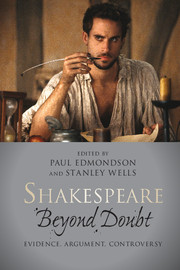Book contents
- Frontmatter
- Content
- List of illustrations
- List of contributors
- General introduction
- Part I Sceptics
- Part II Shakespeare as author
- Part III A cultural phenomenon: Did Shakespeare write Shakespeare?
- 14 ‘This palpable device’: Authorship and conspiracy in Shakespeare's life
- 15 Amateurs and professionals: Regendering Bacon
- 16 Fictional treatments of Shakespeare's authorship
- 17 The ‘Declaration of Reasonable Doubt’
- 18 ‘There won't be puppets, will there?’: ‘Heroic’ authorship and the cultural politics of Anonymous
- 19 ‘The Shakespeare establishment’ and the Shakespeare authorship discussion
- Afterword
- A selected reading list
- Notes
- Index
17 - The ‘Declaration of Reasonable Doubt’
from Part III - A cultural phenomenon: Did Shakespeare write Shakespeare?
Published online by Cambridge University Press: 05 April 2013
- Frontmatter
- Content
- List of illustrations
- List of contributors
- General introduction
- Part I Sceptics
- Part II Shakespeare as author
- Part III A cultural phenomenon: Did Shakespeare write Shakespeare?
- 14 ‘This palpable device’: Authorship and conspiracy in Shakespeare's life
- 15 Amateurs and professionals: Regendering Bacon
- 16 Fictional treatments of Shakespeare's authorship
- 17 The ‘Declaration of Reasonable Doubt’
- 18 ‘There won't be puppets, will there?’: ‘Heroic’ authorship and the cultural politics of Anonymous
- 19 ‘The Shakespeare establishment’ and the Shakespeare authorship discussion
- Afterword
- A selected reading list
- Notes
- Index
Summary
The ‘Declaration of Reasonable Doubt’ is a petition whose signatories assert that there is reasonable doubt that William Shakespeare was the true author of the plays attributed to him. First launched in 2007 and principally authored by John M. Shahan, the Declaration has two principal aims: to petition for the authorship question to be treated as a serious academic topic and taught as such in schools and universities; and to present anti-Shakespearians as reasonable people. Since its launch, the Declaration has attracted over 2,000 signatories, among them university professors, Supreme Court judges and well-known actors. The Declaration is primarily an online document, although hard copies have been produced for highly publicized signing events in Los Angeles, Portland and, in the UK, Chichester. However, it is much more than just a document. The website, doubtaboutwill.org, is also a focus for anti-Shakespearian sentiment, and the organization behind both, the Shakespeare Authorship Coalition (SAC), has emerged as the organized voice of anti-Shakespearians, who may not agree on who did write the plays, but can agree on who didn't.
In his book Contested Will, James Shapiro praises the Declaration for its inspired title and ‘skilfully drafted’ text. Shapiro does not critique the Declaration, and instead sets out his case for Shakespeare in the following chapter. The SAC's response, published on the Declaration website, thanks Shapiro for his generosity, and then attacks him for not engaging with the Declaration's arguments. This chapter will similarly disappoint SAC readers looking for a thorough, point-by-point rebuttal. My purpose here is to consider the Declaration and its aims, to evaluate its success and to look more closely at the people who have signed it, particularly academics.
- Type
- Chapter
- Information
- Shakespeare beyond DoubtEvidence, Argument, Controversy, pp. 201 - 214Publisher: Cambridge University PressPrint publication year: 2013
- 1
- Cited by



